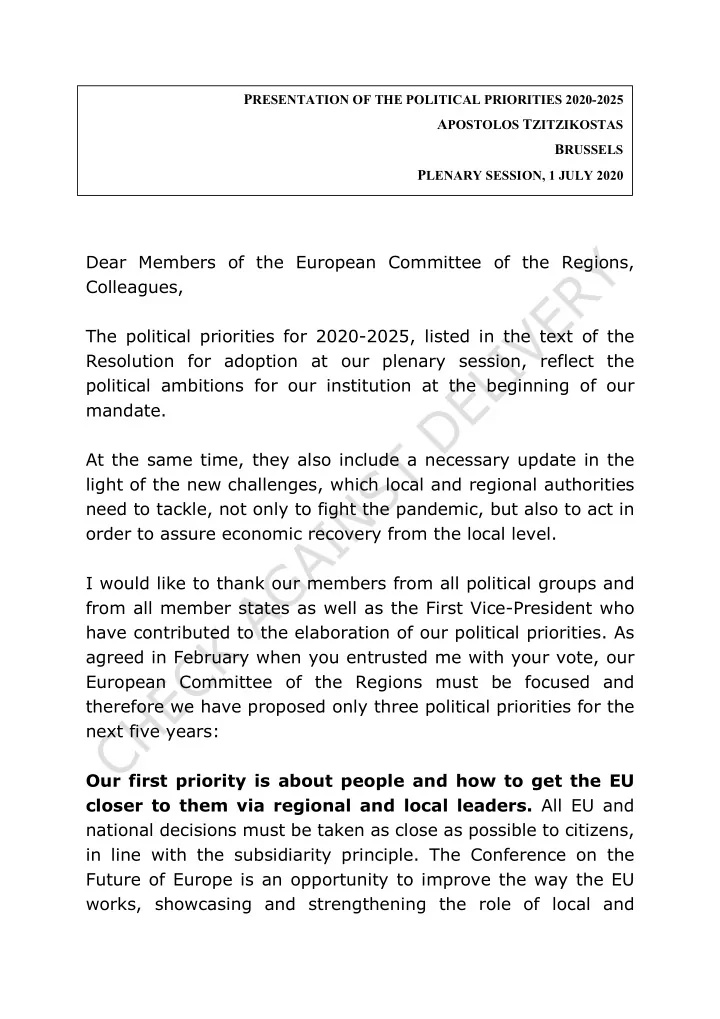

P RESENTATION OF THE POLITICAL PRIORITIES 2020-2025 A POSTOLOS T ZITZIKOSTAS B RUSSELS P LENARY SESSION, 1 JULY 2020 Dear Members of the European Committee of the Regions, Colleagues, The political priorities for 2020-2025, listed in the text of the Resolution for adoption at our plenary session, reflect the political ambitions for our institution at the beginning of our mandate. At the same time, they also include a necessary update in the light of the new challenges, which local and regional authorities need to tackle, not only to fight the pandemic, but also to act in order to assure economic recovery from the local level. I would like to thank our members from all political groups and from all member states as well as the First Vice-President who have contributed to the elaboration of our political priorities. As agreed in February when you entrusted me with your vote, our European Committee of the Regions must be focused and therefore we have proposed only three political priorities for the next five years: Our first priority is about people and how to get the EU closer to them via regional and local leaders. All EU and national decisions must be taken as close as possible to citizens, in line with the subsidiarity principle. The Conference on the Future of Europe is an opportunity to improve the way the EU works, showcasing and strengthening the role of local and
regional authorities in the EU. We will also continue to ensure new EU legislation reduces administrative burden and implementation costs for our regions. Our second priority is about the current challenges: pandemic, green, digital and demographic, including the migratory flows. We must understand and tackle these societal transformations facing our villages, cities and regions. Coming out successfully from these challenges can be only possible if it's based on a stronger resilience of local communities. Our third priority is about cohesion as a fundamental value and benefit for our people via all of the EU’s policies and programmes. Fostering cohesion in Europe needs an ambitious long-term EU budget that offers sufficient structural and cohesion funding and agricultural investment for all regions and cities. Nevertheless, cohesion is more than just money: it is a value that leads sustainable economic growth, creates long- term employment opportunities for all and delivers place-based policies that meets citizens’ needs. All our priorities will be mirrored in modern and dynamic communication campaigns, which will send a strong message about the real added value of the EU, its regions, towns and villages. Dear Members, dear staff, dear friends, The one million local and regional elected politicians are both Europe's foundations and its safety net. Thanks to them, our citizens can overcome the worst moments and move toward recovery since local leaders provide every day concrete answers to the needs of their communities.
The pandemic has showed that all levels of governance must work together in they want to come up with solutions that secure and improve the life of our people. Let us all be aware of this one reality and share it around us: today the two dimensional Europe is old politics, away from people’s needs. If we are serious about the EU as a home of its people, we must also try to reflect the support needed to its threefold construction: the EU is protecting looking roof; the Member States as solid pillars and walls; and, finally but essential for any house – its foundations represented by the regional and local authorities. The EU needs to change and renovate its construction in a three- dimensional way in order to reflect the local and regional governments' role in the EU decision-making – and this will be one major message that we will deliver at the Conference on the Future of Europe. Dear Members, During the first five months of this new mandate the reality on the ground showed, once more, that the regional and local dimension of the EU cannot be perceived by the Brussels bubble or by our Governments in the Capitals as something that shall be avoided because of the extra-complexity that it could bring to the decision making process. There is no chance to succeed without us because we are the foundation of the European construction. However, if we want to make an impact as European Committee of the Regions, our house and all of us must change our needy demanding tone into a more courageous and responsible mode, grounded in our institutional remits but also in the power of our membership.
Dear colleagues, I commend the resolution on the political priorities. I count on all of you to succeed. We can only do it together and united. Thank you.
Recommend
More recommend